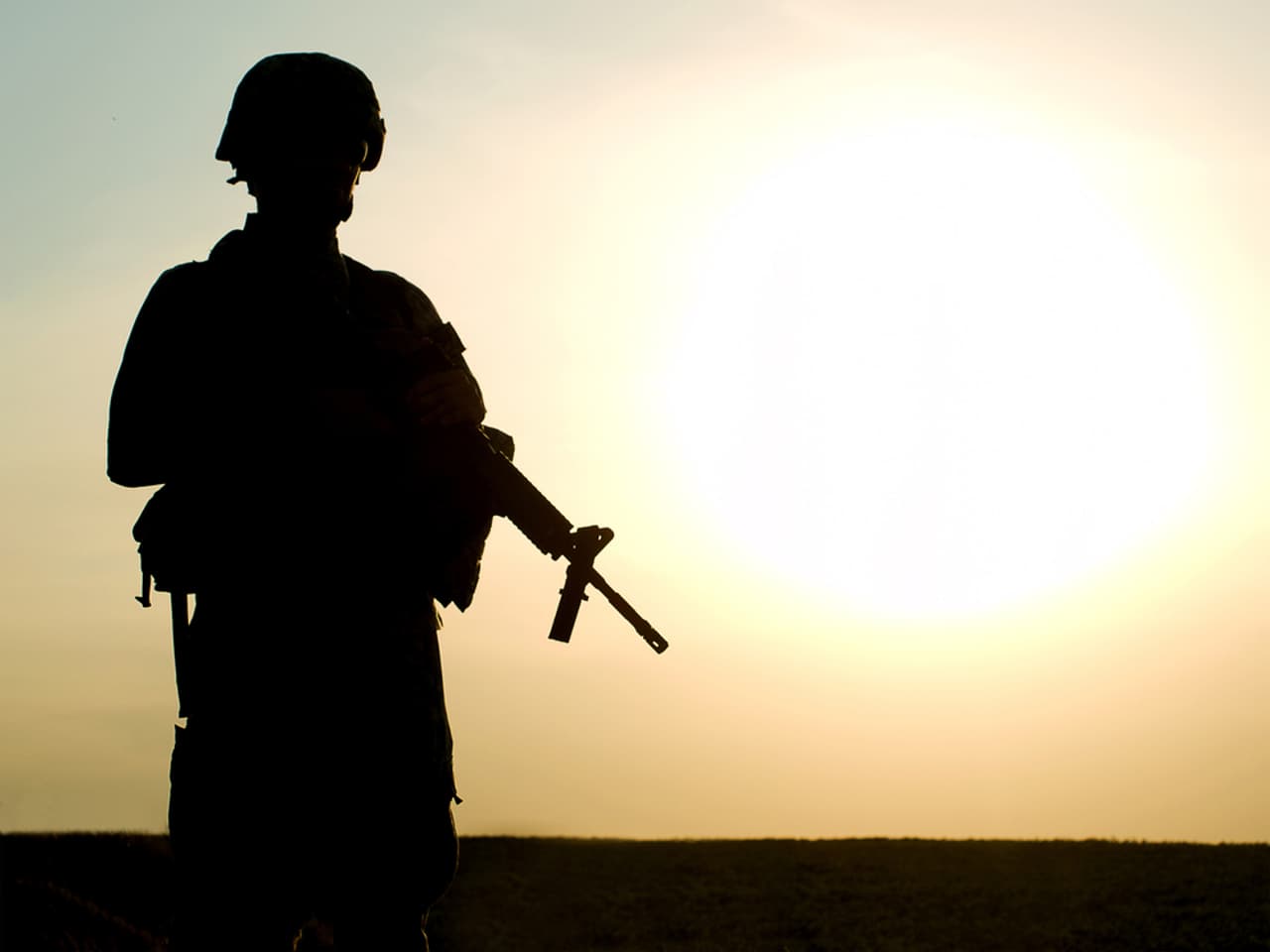
Fears for prisoners left behind after Afghan withdrawal
A soldier stands guard (Image: Shutterstock)
The Bureau has established that around 70 prisoners are still being held in British military bases in Afghanistan, waiting to be transferred to the Afghan authorities. Despite aiming to transfer all such detainees by the time of Britain’s withdrawal from Afghanistan in 2014, as the Bureau revealed back in November, the government has been forced to re-impose a moratorium on the transfer of UK-captured prisoners into Afghan custody. The government accepts that the individuals concerned currently face a real risk of mistreatment or torture if transferred.
Since 2006, British forces have been detaining suspected insurgents in Afghanistan as part of Operation Herrick. As of October 2010, the UK had detained 1,399 individuals, at least 487 of whom had been transferred to the Afghan authorities. Since then, at least seven further transfers have taken place.
As of October 2012 the UK had detained 1,399 individuals, at least 487 of whom had been transferred to the Afghan authorities.
The government had hoped to reduce the number of detainees in line with ongoing troop withdrawals which are due to be completed by 31 December 2014. But in November Defence Secretary Philip Hammond revealed new evidence suggesting that prisoners transferred to Afghanistan’s National Directorate of Security (NDS) were at ‘real risk of serious mistreatment’.
It would be a breach of international law to transfer detainees to the custody of another state under such circumstances. And human rights groups monitoring the situation are concerned that the safeguards to prevent mistreatment when the detainees are transferred are untested.
Beatings and shackling
The November moratorium coincided with a High Court ruling on the legality of prisoner transfer to the Afghan authorities. The case had been brought on behalf of Serdar Mohamed, an Afghan farmer who was arrested by British forces in April 2010. He was later transferred to a number of NDS facilities in which he is alleged to have suffered extensive mistreatment and torture.
According to his lawyers, Mohamed was deprived of sleep for a continuous 72 hour period while detained in Kabul. During this time he was hooded and handcuffed to a bar.
The Bureau’s research suggests that the UK is now responsible for the detention of approximately 70 detainees in Afghanistan. The MoD would neither confirm nor deny this figure.
Mohamed’s legal team told the court that the mistreatment included ‘beatings on his feet, twisting of his testicles, causing intense pain and bleeding from his penis for at least a month afterwards, and extended periods of shackling so his body was bent backwards in an arc.’
The Ministry of Defence (MoD) had previously argued that prisoners could be handed to the Afghan authorities in a manner that was consistent with its policy not to transfer to facilities where there are grounds to believe that serious mistreatment is taking place.
However, as the Defence Secretary accepted in November, this calculation is no longer workable.
Four out of the seven prisoners who have been transferred from British custody since 2010 have made allegations of mistreatment in Afghan custody.
The Bureau’s own research, informed by discussions with human rights groups and legal teams acting on behalf of the Afghan detainees, suggests that the UK is now responsible for the detention of approximately 70 detainees in Afghanistan. A spokesperson for the MoD would neither confirm nor deny this figure.
Monitoring torture
As the withdrawal date for Britain’s military draws closer, the UK’s approach to arrests and detentions has shifted. Although its troops regularly seize suspected Taliban insurgents, operations are now conducted in conjunction with Afghan forces.
According to Peter Quentin, a Research Analyst at the Royal United Services Institute: ‘There are considerable regulations on detention procedures, to the extent that troops have, if at all possible, avoided detaining individuals and left it to their partnered Afghan National Security Force.’
‘The questions are: who is doing the monitoring [in Britain’s detention facilities], how experienced are they, [and] how much continuity is there in terms of them interacting with individual prisoners?’
Heather Barr, Human Rights Watch
The question of what to do with existing prisoners is more difficult. Basic ‘safeguards’ against mistreatment, including CCTV cameras and logbooks for recording malpractice, have been installed in NDS detention facilities. However, lawyers representing the UK’s Afghan detainees claim that these have yet to be fully implemented and in many cases, are untested.
Conditions within detention facilities are monitored by a team of military personnel known as the UK Detention Oversight Team (UKDOT). The group liases with the Afghan authorities to secure regular and private access to post-transfer UK-captured detainees, who are also visited by Embassy officials and the International Committee of the Red Cross.
Members of UKDOT conduct interviews with UK-transferred prisoners, questioning them about their detention experience and giving them an opportunity to formally register allegations of mistreatment.
The British government describes these visits as ‘key elements of the UK’s strategy for mitigating the risk of mistreatment.’
A problematic approach
However, critics argue that British monitoring efforts are at best ineffective and at worst lead to a systematic cover-up of abuse. Human rights charity Reprieve has documented examples of British monitors finding torture equipment in interrogation rooms, but saying nothing out of fear of ‘causing a scene’.
There are also concerns over the level of access that British monitors have within detention facilities, and over the artificial nature of their inspection. The Afghan authorities receive forewarning of UKDOT’s arrival, a factor that Richard Stein of Leigh Day and Co, the legal firm representing Serder Mohamed, says encourages the cover-up, rather than the eradication, of abuses.
According to Heather Barr, Afghanistan researcher for Human Rights Watch, these measures can only achieve limited success in the absence of an internally-driven effort to stamp out torture.
However, she believes that there are a host of factors that can affect the success of Britain’s detention monitoring programme: ‘The questions are: who is doing the monitoring, how experienced are they, [and] how much continuity is there in terms of them interacting with individual prisoners?’
British detention monitors are recruited from within the military and the usual six-month rotation period for UK personnel in Afghanistan makes it difficult to ensure continuity. According to Barr, this makes it harder for UK officials to build up the necessary rapport with individuals who are expected to use the short interview to give an honest account of their treatment within the facility.
‘The complexity of the society here means that if you’re a British military officer who showed up a week or two ago to take over from someone else, you’re not going to have much capacity to understand any of this and to navigate the reefs that exist along the way’, says Barr.
The way forward
As the date for military withdrawal draws closer, time is running out for the British authorities to find a workable and legally acceptable solution to prisoner transfer. Barr emphasises that there may be a difference between the ‘right’ solution and the course of action that is most likely in light of the impending troop withdrawal.
‘[The UK] is committed to working closely with the Afghan authorities to promote peace and security while respecting Afghan sovereignty and honoring international human rights.’
Ministry of Defence spokesman
The answer to the first question, she says, is for the British government, in conjunction with other key donor countries, to get tougher with the Afghan authorities: ‘Donors who have a presence in Afghanistan and who are funding the Afghan security forces need to tell [President] Karzai. ‘if you don’t end the torture, we’re going to stop the money’.’
However, in practise, Barr believes that the British solution is likely to involve an attempt to strengthen the safeguards against mistreatment that UK monitors have already begun to install in Afghan detention facilities.
When asked to comment, a spokesperson for the MoD described the ongoing detention operations as an ‘important part’ of the UK’s work in Afghanistan, emphasising that it ‘is committed to working closely with the Afghan authorities to promote peace and security while respecting Afghan sovereignty and honoring international human rights obligations.’




